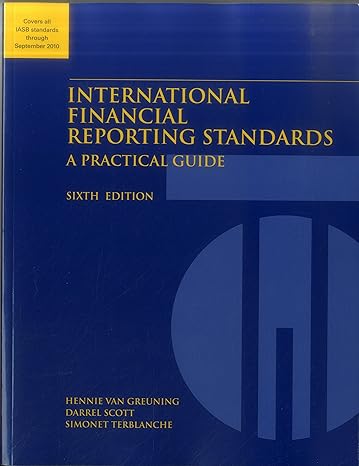Question
Helix Company produces several products in its factory, including a karate robe. The company uses a standard cost system to assist in the control of
| Helix Company produces several products in its factory, including a karate robe. The company uses a standard cost system to assist in the control of costs. According to the standards that have been set for the robes, the factory should work 780 direct labor-hours each month and produce 1,950 robes. The standard costs associated with this level of production are as follows: |
| Total | Per Unit of Product | ||
| Direct materials | $ | 35,490 | $ 18.20 |
| Direct labor | $ | 7,020 | 3.60 |
| Variable manufacturing overhead (based on direct labor-hours) | $ | 2,340 | 1.20 |
| | |||
| $ 23.00 | |||
| | |||
| |
| During April, the factory worked only 760 direct labor-hours and produced 2,000 robes. The following actual costs were recorded during the month: |
| Total | Per Unit of Product | ||
| Direct materials (6,000 yards) | $ | 36,000 | $ 18.00 |
| Direct labor | $ | 7,600 | 3.80 |
| Variable manufacturing overhead | $ | 3,800 | 1.90 |
| | |||
| $ 23.70 | |||
| | |||
| |
| At standard, each robe should require 2.8 yards of material. All of the materials purchased during the month were used in production. |
| Required: | |
| 1. | Compute the materials price and quantity variances for April: (Input all amounts as positive values. Leave no cells blank - be certain to enter "0" wherever required. Indicate the effect of each variance by selecting "F" for favorable, "U" for unfavorable, and "None" for no effect (i.e., zero variance). Round your intermediate calculations to 2 decimal places. Round your final answers to the nearest dollar amount.) |
| Materials price variance | $ | (Click to select)UNoneF |
| Materials quantity variance | $ | (Click to select)FNoneU |
| |
| 2. | Compute the labor rate and efficiency variances for April: (Input all amounts as positive values. Leave no cells blank - be certain to enter "0" wherever required. Indicate the effect of each variance by selecting "F" for favorable, "U" for unfavorable, and "None" for no effect (i.e., zero variance). Round your intermediate calculations to 2 decimal places. Round your final answers to the nearest dollar amount.) |
| Labor rate variance | $ | (Click to select)UFNone |
| Labor efficiency variance | $ | (Click to select)NoneUF |
| |
| 3. | Compute the variable manufacturing overhead rate and efficiency variances for April: (Input all amounts as positive values. Leave no cells blank - be certain to enter "0" wherever required. Indicate the effect of each variance by selecting "F" for favorable, "U" for unfavorable, and "None" for no effect (i.e., zero variance). Round your intermediate calculations to 2 decimal places. Round your final answers to the nearest dollar amount.) |
| Variable overhead rate variance | $ | (Click to select)NoneFU |
| Variable overhead efficiency variance | $ | (Click to select)UNoneF |
Step by Step Solution
There are 3 Steps involved in it
Step: 1

Get Instant Access to Expert-Tailored Solutions
See step-by-step solutions with expert insights and AI powered tools for academic success
Step: 2

Step: 3

Ace Your Homework with AI
Get the answers you need in no time with our AI-driven, step-by-step assistance
Get Started


